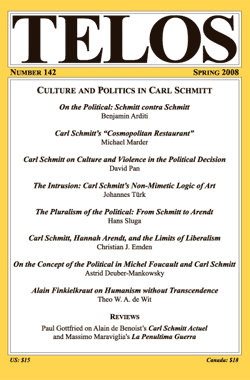As an occasional feature on TELOSscope, we highlight a past Telos article whose critical insights continue to illuminate our thinking and challenge our assumptions. Today, Flaminia Incecchi looks at David Pan’s “Carl Schmitt on Culture and Violence in the Political Decision” from Telos 142 (Spring 2008).
 David Pan’s “Carl Schmitt on Culture and Violence in the Political Decision” aims at challenging the widespread view that Carl Schmitt’s decisionism is motivated by violence and pure power. Pan presents his readers to “another Schmitt” that has escaped the attention of many commentators, including Müller, Žižek, McCormick, and Agamben. For Pan, Schmitt’s decision must not be separated from spiritual ideals and cultural values.
David Pan’s “Carl Schmitt on Culture and Violence in the Political Decision” aims at challenging the widespread view that Carl Schmitt’s decisionism is motivated by violence and pure power. Pan presents his readers to “another Schmitt” that has escaped the attention of many commentators, including Müller, Žižek, McCormick, and Agamben. For Pan, Schmitt’s decision must not be separated from spiritual ideals and cultural values.
Pan takes his readers through a series of complex arguments that provide grounding for the claim that the role of decisionist violence must be understood “within a framework in which values and ideas mediate the human relation to violence.”[1]
The implicit premise of Pan’s argument is an interpretation of Schmitt as a quasi-Hegelian,[2] who sees political authority and structures as the embodiments of ideas. To begin with, for Pan, Schmitt sees “a people’s ‘sense of right'” (60) as the source of law. The sovereign’s job is then to understand the people’s beliefs and to encode those views in the law. As a result, the laws emanate the people’s will. Now, when the sovereign decides that there is a state of exception and suspends the law to devise a course of action aimed at a restoration of normalcy, “what is being preserved is not the life of the individual, not bare life itself, but a particular set of ideas around which the state is built” (64). Pan’s argument therefore hinges on a rejection of the exception as a moment driven by biopolitical considerations, in favor of a richer and epistemically compelling moment. The epistemological gloss to the story is added via the reflection that the people and the sovereign make in order to decide what they want to protect, a decision that cannot be made at an earlier time and encoded in a legal norm. In this moment considerations of self-identity and eternal forms arise (56).
This in turn, leads Pan to the conclusion that “the decision is not a violent and chaotic act that negates order, but the constituting form of law that establishes the first set of distinctions and value judgments upon which the law itself is based” (67). At this point the reader demands an answer to two interrelated questions: How does the state of exception come about? What is at stake in it? Pan answers both questions intelligently and in perfect congruence with his reading of Schmitt as a quasi-Hegelian.
Pan’s reply to the first dilemma is that “the state of exception begins when there is a multiplicity of orders that are in conflict” (67). Therefore, the exception appears when a number of competing views about the defining values and traits of the common good come into conflict. The sovereign must choose one of those orders and competing views, thereby rejuvenating or reinventing the political unit in accordance with the new order. Hence, for Pan, “The decision on when order has been threatened or disturbed is as its foundation a decision about what ultimate values are embodied in a particular political order in contrast to other possible orders” (66).
And what is at stake in the exception? Pan answers very explicitly, arguing that “the main issue is to define and defend what the general interest should be and thus when its general interest is threatened” (66). Here Pan’s rejection of the biopolitical interpretation appears in all its clarity: “The state does not seek in the first place to preserve the lives of its citizens, for Schmitt, but to preserve itself as a particular symbolic order grounded on one specific theology that is in active competition with one or more other theological perspectives” (65). Hence, the state is not just a set of biological individuals, but a conglomeration of people that together form a spirit.
Pan’s article is an intelligent attempt to show that Schmitt’s decision is not a moment of pure violence, but an intricate process of self-definition and reflection about what constitutes the spirit of a people. By doing so, it sheds light on the more philosophical and artistic aspects of Schmitt, as opposed to the well-known juristic and political facets of his thought. Pan also touches upon fundamental questions that go beyond the horizon of Schmitt scholarship, and constitute the implicit pillars of political theory and philosophy. Among those we find the perennial but somehow neglected question of what makes a state and what is the essence of the people constituting that state.
Notes
1. David Pan, “Carl Schmitt on Culture and Violence in the Political Decision,” Telos 142 (2008): 49–72; here, p. 49. Additional references will be cited parenthetically in the text.
2. To be sure, Pan is not the only advocate of this reading. For a similar stance see: Jan Müller, “Carl Schmitt’s Method: Between Ideology, Demonology and Myth,” Journal of Political Ideologies 4, no. 1 (1999): 61–85









Who’s decide about the exceptions ? I suppose is the hegemonic power.So, how can we be sure to measure the advantage to the people?